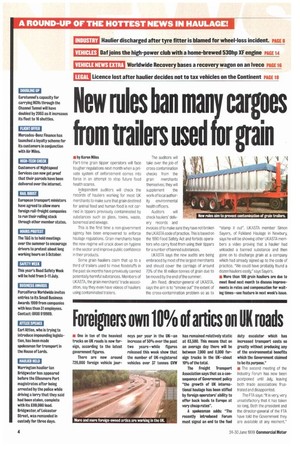New rules ban many cargoes from trailers used for gain
Page 6

If you've noticed an error in this article please click here to report it so we can fix it.
• by Karen Miles Part-time grain tipper operators will face tougher regulations next month when a private system of enforcement comes into force in an attempt to stop future food health scares.
Independent auditors will check the records of hauliers working for most UK merchants to make sure that grain destined for animal feed and human food is not carried in tippers previously contaminated by substances such as glass, toxins, waste, bonemeal and sewage.
This is the first time a non-government agency has been empowered to enforce haulage regulations. Grain merchants hope the new regime will crack down on hygiene in the sector and improve public confidence in their products.
Some grain hauliers claim that up to a third of trailers used to move foodstuffs in the past six months have previously carried potentially harmful substances, Members of UKASTA, the grain merchants' trade association, say they even have videos of hauliers using contaminated trailers. The auditors will take over the job of cross-contamination checks from the
grain merchants themselves; they will
supplement the work of local authority environmental health officers.
Auditors will check hauliers' delivery records and invoices of to make sure they have not broken the UKASTA code of practice. This is based on the 1990 food Safety Act and forbids operators who carry food from using their tippers for a number of banned substances.
UKASTA says the new audits are being embraced by most of the largest merchants and should cover the carriage of around 70% of the 18 million tonnes of grain due to be moved by the end of the summer.
Jim Reed, director-general of UKASTA, says the aim is to "smoke out" the extent of the cross-contamination problem so as to
"stamp it out". UKASTA member Simon Sayers, of Falkland Haulage in Newbury, says he will be showing other UKASTA members a video proving that a haulier had unloaded a banned substance and then gone on to discharge grain at a company which had already signed up to the code of practice. 'We could have probably found a dozen hauliers easily,' says Sayers.
• More than 100 grain hauliers are due to meet Heed next month to discuss improvements in rates and compensation for waiting times—see feature in next week's issue.




















































































































